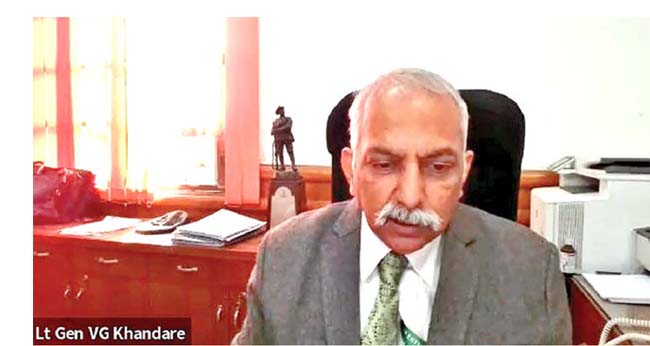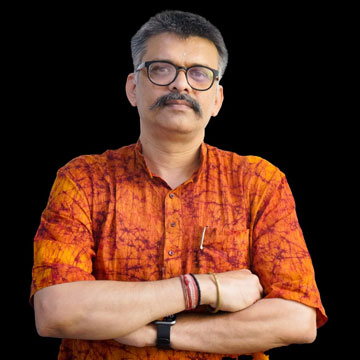Republic Day is known for projecting nation’s militaristic strength and celebrating the vibrancy of our republic. In the run up to this Republic Day, Prafulla Ketkar, Editor Organiser, had a conversation with Lt General (Retd) Vinod G Khandare, a decorated officer, who is currently serving as principal adviser to the Ministry of Defence, to discuss India’s defence preparedness. excerpts:
The geo-political landscape of the world is undergoing a transition. We have a resurgent China challenging power equations, an energy crisis following the Russia-Ukraine war, and the economic challenges in a post-pandemic world. Where do you think India stands in this scenario?
I want to begin with congratulating ourselves for being able to defend our democracy in this troubled situation in South Asia, especially in view of the geo-strategic environment, our border situation, and especially the role of the West like abandoning weaponry behind in Afghanistan for the Taliban to use. People from the West are the cause of most of the trouble in Asia and Europe.
Where do we find India in all of this? Here I want to emphasise that when we talk of defence preparedness, we should talk of the nation as a whole, not just the military. Nations go to war and the military plays a supportive role. The Russia-Ukraine crisis has manifested itself as an energy crisis, and Foreign Minister S Jaishankar has very well presented our point of view. Both China and India have benefitted by the sanctions imposed on Russia. Our national interest is prime, and we will always do what benefits us, even if it irks the West. We have seen, right from 1947-48 onwards, how much ‘concern’ the West has for India’s problems. They have only consistently pushed the ‘human rights’ agenda on us.
As far as China is concerned, we are always on guard. In the face of China’s adventurism, we have always resolutely safeguarded our sovereignty along our borders and maritime waters. Will China go in for Taiwan? That’s a bigger question for the US, Australia and Japan. It will definitely be a signal for us, but we are not waiting for a trigger. We are already preparing to defend our sovereignty in every situation.
The Government is already looking at alternate sources of energy as well as “Aatmanirbharta” in every sector – which is a big part of the nation’s preparedness. We also have to identify potential adversaries and be prepared for every situation.
Taking the Aatmanirbharta issue forward, this is the first time that we have started talking about exports in the defence sector. What is the reality? Are we in a position to decrease our imports of weaponry and defence equipment, and increase our domestic production and exports?
In the past, we were one of the biggest importers of defence products. We seemed very proud of it, when in reality it only showcased our inability to design and manufacture indigenously. From 1947 onwards, we have been persistently guarding our sovereignty using conventional weapons. India, like Israel, has had to defend its borders since birth. We needed sophisticated weaponry but the ruling party of that time did not even want to see defence officials in the Ministry of Defence! The then Prime Minister had a utopian view of global peace, leading to the embarrassment of 1962. Following that humiliation, Pakistan attacked us in 1965. We were torn between taking USA’s or Russia’s help. Then the 1971 war happened. The creation of Bangladesh was a historical win. But we learnt the lesson that we can’t be dependent on superpowers. We were heavily dependent on the Russian lobby. Our defence imports were depleting our foreign reserves. We were paying double the cost, which also happened to coincide with the brain drain of our engineers. We were talking about Aatmanirbharta all through but it’s the present Government that has rolled out the action plan. It’s slow, but the direction has been taken. In 2019, General Rawat released the first list of 101 products that we will manufacture, and stop importing as per different timelines. Today we have a list of over 400 products. We are involving both the public and private sectors. We can’t stop imports completely, as it’s not cost effective to produce every component ourselves. We have started exporting to some extent, but we have to go a long way. We need more capital for research and development. There is no push button solution. It needs an eco-system that is surely forming.
As someone who has been part of many policy making bodies, please tell us what has changed in India’s defence policy. Be it Galwan, the surgical strikes, more autonomy to Armed Forces, Aatmanirbharta, or even our multi-allied foreign policy and defence ties – we are doing a lot of things simultaneously. What has made us so confident?
Our strategically autonomous foreign policy has helped India exhibit tremendous agility in establishing relations on our terms. We have maintained our balance and not taken sides, whether it is Russia, America, Iran and Israel, or UAE and Qatar. We have never had an agenda. We are not like China, where we deal with a country and shut our debt trap. We are not even like the West, where we say tow our line or we will impose sanctions. We have been nonaligned yet agile. We are development-oriented, which means our relations are purely from a point of view of bilateral benefits. We are the preferred country that can be approached – we don’t do ‘my way or highway’. We indulge in policies that work best for our national interest.
What is Mission Sagar? We are developing a maritime ecosystem that will help us both economically and strategically. It’s believed the next few decades belong to the Indo Pacific region. What is your view?
The maritime domain is very important – both for security and development, as the sea route is the most affordable way for trade and moving stock. We have always been a sea faring nation. Even when Vasco da Gama reached our shores, our ships were bigger than the vessel he arrived in. We have to rediscover our ship-making art. Our first focus is the Indian Ocean, not the complete Indo-Pacific. The Prime Minister is focussing on keeping it a peaceful region, and trade will follow. We are looking at both protecting and promoting our blue economy. Currently we are way behind China in this department, which was very weak in its Navy initially. We have to get our act together in the maritime domain.
We have seen vast development in border infrastructure. What has changed? Has BRO changed or has our approach changed? How are we placed vis-à-vis China?
There is still an infrastructural deficiency in border areas, but a marked attitudinal shift has happened. Earlier we used to say ‘don’t make roads, the Chinese will use them’. That was a very negative way of thinking. The Chinese have often transgressed and created trouble even after 1962, but we have always managed to handle the situation. Now they’ve realised it’s a different India. In the last eight years we have accelerated the development of infrastructure along the borders. Budget allocation has gone up, the plant equipment has been modernised, our officers are working on specialised infrastructure. Even policy wise the NSA has focussed on this region and made allocations with agility. More needs to be done as the deficit of decades has to be filled fast. So the whole nation has to come together – both public and private sectors of different States.
Another sensitive area is cyber space and information security. This is the space where wars are being fought and democracies seem more under threat as public opinion can be diverted or manipulated. Where do we stand?
These are the new forms of warfare. The ancient wisdom of Chanakya comes in here, of how one can wage a war with plausible deniability. Today, cyber espionage in security and democratic fields is only worsening. As I said earlier, nations go to war. Even in this area, civilians have to play their role. Cyber defence is our collective responsibility. We have to be cautious of the information being spread or discussions we participate in. We have to take this very seriously, as our adversaries will look for internal faultlines. Today cyber terrorism can reach a village sarpanch, a research lab, or the PMO’s office with equal ease. We, especially the educated lot, have to be aware of data sovereignty. We should also harness cyber warriors who promote a patriotic narrative.
What is your message to the patriots of our nation? Do we lack strategic culture as a society? How can we develop strategic thinking about our adversaries and about building on our strengths?
Did we always lack strategic culture? No. Our country would not have been so developed had it been so. Our economy was so vibrant because we understood the concept of comprehensive growth, which is why we were known as sone ki chidiya. Unfortunately we lost it along the way and started missing the bigger picture. We are still in the process of regaining that understanding. As a society, we need to revisit our ancient wisdom so as to become more astute in reading situations and behaviours, and react accordingly. We must learn to identify our present and potential adversaries. A well-honed strategic culture is imperative for national defence preparedness.




















Comments